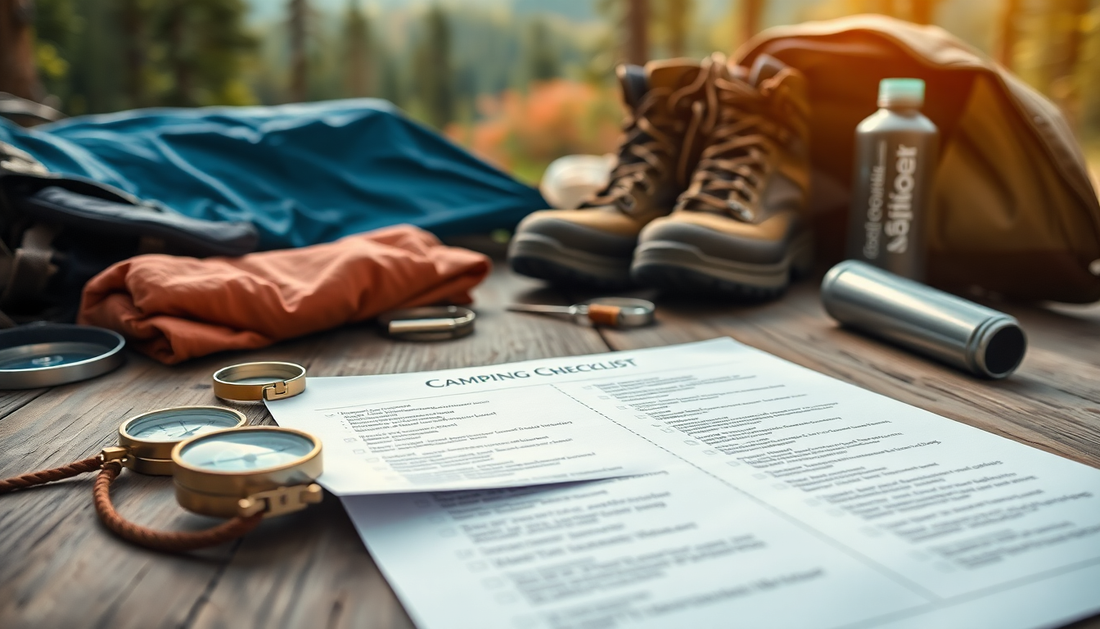
The Ultimate Camping Checklist: What to Pack for Your Next Outdoor Adventure
Share
Embarking on a camping trip is an exhilarating experience that allows you to disconnect from the hustle and bustle of everyday life and immerse yourself in the great outdoors. However, the success of your adventure often hinges on the preparation and planning that goes into it. One of the most crucial aspects of this preparation is ensuring you have the right gear and supplies to make your camping experience comfortable, safe, and enjoyable.
That's where a comprehensive camping checklist comes in handy. Whether you're a seasoned camper or a first-time adventurer, having a well-thought-out list of essential items can make all the difference in your trip. In this blog post, we'll dive into the ultimate camping checklist, covering everything you need to pack for your next outdoor adventure.
Essential Camping Gear
Shelter and Sleeping Equipment
The foundation of any successful camping trip is a reliable shelter and comfortable sleeping arrangements. Start by packing a high-quality tent that is suitable for the number of people in your group and the weather conditions you expect to encounter. Don't forget to include a sturdy ground tarp, tent stakes, and a mallet or hammer to secure your shelter.
When it comes to sleeping, a warm and cozy sleeping bag is a must-have. Consider the temperature rating of the bag and choose one that will keep you comfortable throughout the night. A sleeping pad or air mattress can also provide extra cushioning and insulation from the ground, ensuring a good night's sleep.
Clothing and Footwear
Packing the right clothing and footwear is crucial for staying comfortable and prepared in the great outdoors. Pack layers of moisture-wicking, breathable fabrics that can be easily added or removed as the weather changes. Include items like long-sleeved shirts, pants, socks, and a warm jacket or sweater. Don't forget to pack a rain jacket and rain pants to protect you from unexpected showers.
Sturdy, well-fitting hiking boots or shoes are essential for navigating the terrain. Break in your footwear before your trip to prevent blisters and ensure a comfortable fit. You may also want to pack a pair of sandals or water shoes for activities near the water.
Cooking and Food Supplies
Preparing and enjoying meals is an integral part of the camping experience. Pack a portable camping stove, fuel, and cooking utensils to ensure you can whip up delicious meals. Don't forget to bring a cooler with ice for perishable items, as well as non-perishable snacks and easy-to-prepare foods. Remember to pack any necessary dishes, cups, and utensils, and don't forget the can opener and bottle opener!
Safety and Navigation
First Aid Kit
A well-stocked first aid kit is a must-have for any camping trip. Include essentials like bandages, antiseptic wipes, gauze, pain relievers, and any necessary personal medications. It's also a good idea to pack items like tweezers, scissors, and a thermometer.
Emergency Tools
In addition to your first aid kit, you'll want to pack a few essential emergency tools. A reliable flashlight or headlamp, a multi-tool or pocket knife, and a fire starter (such as matches or a lighter) can all come in handy in unexpected situations. Don't forget to include a whistle, which can be used to signal for help if needed.
Navigation Devices and Maps
Even if you're familiar with the area, it's always a good idea to bring a map and compass, or a GPS device, to ensure you can navigate your surroundings. This is especially important if you plan to venture off the beaten path or explore new areas. Additionally, consider packing a portable charger or extra batteries for your electronic devices.
Comfort and Convenience Items
Personal Hygiene Supplies
Maintaining good personal hygiene while camping is important for both comfort and health. Pack items like toilet paper, hand sanitizer, biodegradable soap, and a trowel for proper waste disposal. You may also want to include feminine hygiene products, if applicable, and any necessary medications or supplements.
Lighting and Power Sources
Adequate lighting is essential for navigating your campsite at night and setting the mood around the campfire. Pack a lantern or headlamp, as well as extra batteries. If you plan to use any electronic devices, such as a phone or camera, make sure to bring a portable power bank or solar charger to keep them powered up.
Camping Furniture and Accessories
While not strictly necessary, some camping furniture and accessories can greatly enhance your comfort and convenience. Consider packing a camping chair or hammock, a portable table, and a camping mat or rug to create a cozy outdoor living space. You may also want to bring a camping shade or tarp to provide additional shelter from the sun or rain.
Specific Considerations for Beginners
Tips for First-Time Campers
If you're new to camping, it's important to start with the basics and gradually build up your gear and experience. Begin with a simple, one-night camping trip close to home, and focus on mastering the essentials like setting up your tent and cooking a basic meal. Don't be afraid to ask experienced campers for advice or join a local camping group to learn from others.
Common Mistakes to Avoid
Rookie campers often make a few common mistakes, such as packing too much gear, forgetting essential items, or not properly preparing their campsite. To avoid these pitfalls, stick to your camping checklist, practice setting up your gear at home, and be mindful of the weight and space limitations of your gear.
Budget-Friendly Gear Recommendations
Camping doesn't have to break the bank. Many outdoor retailers offer affordable, high-quality gear for beginners. Look for sales, secondhand items, or even consider renting gear for your first few trips. Focus on the essentials and gradually build up your collection as your experience and budget allow.
Packing and Organization Strategies
Efficient Packing Techniques
Packing your camping gear efficiently can make a big difference in the ease of your trip. Use compression sacks or packing cubes to maximize space in your backpack or car. Group similar items together and label your bags or containers for quick access. Consider the weight and bulk of your gear, and pack the heaviest items closest to your body for better balance.
Weight and Space-Saving Tips
When it comes to camping, less is often more. Opt for lightweight, compact gear whenever possible, and look for multi-purpose items that can serve multiple functions. For example, a single pot that can be used for cooking, boiling water, and washing dishes can save valuable space and weight.
Checklist Template for Easy Reference
To ensure you don't forget any essential items, create a comprehensive camping checklist that you can refer to before each trip. This can be a digital document or a physical checklist that you can print and keep on hand. Regularly review and update your checklist based on your experiences and changing needs.
Conclusion
Packing the right gear for your camping trip is crucial for a successful and enjoyable outdoor adventure. By using this ultimate camping checklist as a guide, you can ensure that you have all the essential items you need, from shelter and sleeping equipment to safety and navigation tools. Remember to pack with efficiency and organization in mind, and don't be afraid to start small and gradually build up your camping gear as you gain more experience.
With a well-stocked camping checklist and a sense of excitement for your upcoming adventure, you'll be well on your way to creating unforgettable memories in the great outdoors. So, what are you waiting for? Start planning your next camping trip and get ready to explore the wonders of nature!
